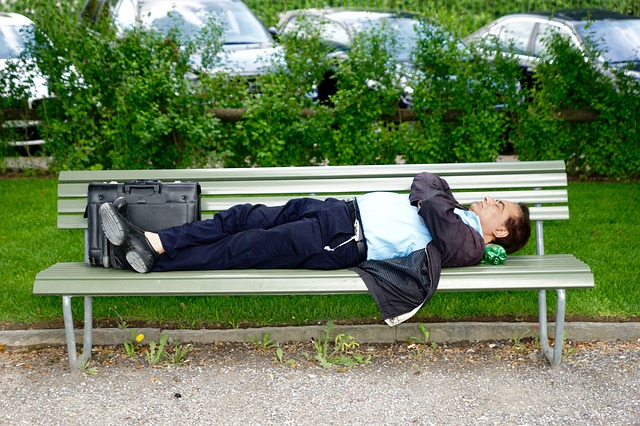It can be temping to sleep-in on the weekend and catch up after a long work week. But does getting extra sleep help or not? Just as there are health issues related to sleep deprivation, oversleeping can cause health problems too. It’s a lot like the three bears, too little or too much may not be as good as simply getting the right amount consistently.
How much sleep is too much?
 It’s difficult to say how much sleep is “just right” for you. Our sleep needs can change over time. For example when you’re fighting a cold you might need a bit more sleep and as you grow older, you tend to require less sleep. The general rule, [1]according to the National Sleep Foundation, is for adults 18 – 64 to get between 7 – 9 hours per night. Older adults over 65 generally do well with 7 – 8 hours of sleep each night.
It’s difficult to say how much sleep is “just right” for you. Our sleep needs can change over time. For example when you’re fighting a cold you might need a bit more sleep and as you grow older, you tend to require less sleep. The general rule, [1]according to the National Sleep Foundation, is for adults 18 – 64 to get between 7 – 9 hours per night. Older adults over 65 generally do well with 7 – 8 hours of sleep each night.
Why do some people oversleep?
There are many reasons people oversleep. Sleep disorders and medical conditions such as hypersomnia, sleep apnea and depression can cause people to oversleep. Other possible causes of oversleeping include the use of certain substances, like alcohol and some prescription medications. Finally, some people just want to sleep a lot but that can come with health risks.
Health Issues Related to Oversleeping
Diabetes
According to a study cited by WebMD [2] Americans studied who slept more than 9 hours every night were at a 50% higher risk for diabetes, the same as those who slept less than 5 hours per night. The study seems to support the concept of getting the right amount of sleep regularly.
Heart Health
Too much sleep could put you at a higher risk for heart related issues. [3]Researchers from Chicago Medical School found that people who get more than eight hours of sleep a night are at an increased risk for heart problems like stroke, congestive heart failure and heart attack.
Weight Gain
It’s long been known that too little sleep can contribute to weight gain but too much sleep can work against you too. A Canadian study found people who slept 10 hours a night were 25 percent more likely to gain 5 kilos (about 11 pounds) over the course of six years compared to those who slept less.
In another study cited by the [4] National Sleep Foundation…
” Northwestern Medicine found that late sleepers consumed 248 more calories a day, mainly at dinner and later in the evening. They ate half as many fruits and vegetables, twice the fast food and drank more full-calorie sodas than those with earlier sleep times. “
Pain and Inflammation
Too much sleep may contribute to increased pain and inflammation in the body. According to a BBC report a small sleep study done at Arizona State University found that participants reported increased inflammation as a result of sleeping an extra two hours each night.
“The participants in the study also complained about soreness and back pain. This makes Youngstedt [The Author of the Study] wonder whether the problem with long sleep is the prolonged inactivity that goes with it.” – http://www.bbc.com/news/magazine-31928434
Mortality
In a [5]2010 study researchers found that sleeping more than 8 hours a night was associated with a 1.3 times greater risk of dying (of any cause) among the 1,382,999 people who took part in the study. The study also concluded that too little sleep increased the risk of dying (of any cause) as well.
Conclusion
Most people sleep in or stay up late once in awhile but when too much or not enough sleep becomes the routine it could put you at a higher risk for serious health issues.
Resources
- National Sleep Foundation Recommends New Sleep Times. (n.d.). Retrieved December 07, 2016, from https://sleepfoundation.org/media-center/press-release/national-sleep-foundation-recommends-new-sleep-times
- Medscape Log In. (n.d.). Retrieved December 07, 2016, from http://www.medscape.com/viewarticle/865647
- Chan, A. L. (n.d.). Too Little And Too Much Sleep Linked With Heart Problems. Retrieved December 07, 2016, from http://www.huffingtonpost.com/2012/03/27/sleep-heart-problems-too-much-too-little_n_1380730.html
- People Who Eat and Sleep Late May Gain Weight. (n.d.). Retrieved December 07, 2016, from https://sleepfoundation.org/sleep-news/people-who-eat-and-sleep-late-may-gain-weight
- Cappuccio FP; D’Elia L; Strazzullo P; Miller MA. Sleep duration and all-cause mortality: a systematic review and meta-analysis of prospective studies. SLEEP 2010;33(5):585-592.




